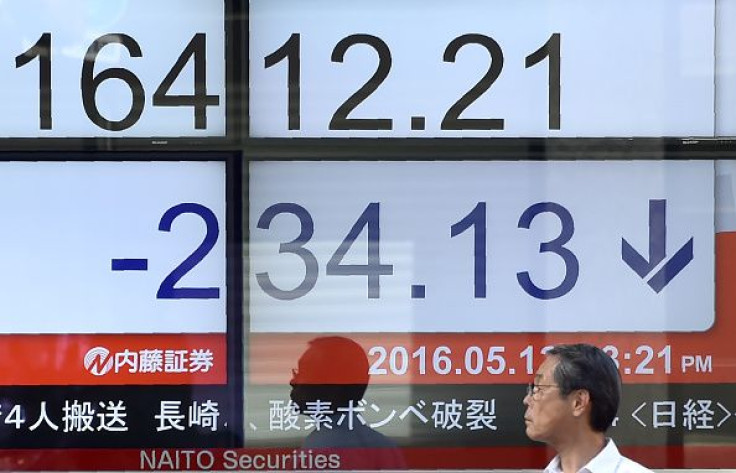Asian Shares Lower On Revived Fed Hike Expectations

Asian shares weakened on Wednesday after strong U.S. inflation data and comments from Federal Reserve officials rekindled prospects of the central bank raising rates later this year.
MSCI's broadest index of Asia-Pacific shares outside Japan fell 0.5 percent in early trade
Japan's Nikkei dropped 0.5 percent, failing to sustain its early firmness after Japan's stronger-than-expected annualized 1.7 percent growth in GDP during the January-March quarter.
Markets are looking to Prime Minister Shinzo Abe's meeting with his coalition party leader, where he could discuss postponing a planned sales tax hike to support the flagging economy.
Wall Street sold off on Tuesday, with the S&P 500 losing 0.94 percent, after U.S. consumer prices recorded their biggest increase in more than three years in April as gasoline and rents rose.
Other data on Tuesday showed housing starts and industrial production rebounded strongly last month, adding to the case for an early rate hike.
U.S. interest rate futures posted large falls with the December 2016 contract declining the most in two-and-a-half months to price in a 70-80 percent chance of a rate hike by then, with a 50 percent chance of a move priced in by September.
The rate-sensitive two-year U.S. Treasury notes yield rose to a three-week high of 0.835 percent.
A few Federal Reserve policymakers repeated their mantra that there could be two rate hikes or more.
Atlanta Fed President Dennis Lockhart, seen as a policy centrist on the board, said on Tuesday that he still assumes there will be two to three rate hikes, a view echoed by San Francisco Fed President John Williams.
Dallas Fed President Robert Kaplan, seen as a hawk, said he will push for an interest rate hike in June or July.
"Since the strong retail sales data last Friday, the Fed has clearly started a communication campaign to urge markets to price in a hike in June, even though markets have not gone there yet," said Tomoaki Shishido, fixed income analyst at Nomura Securities.
"They set (Fed Chair Janet) Yellen's speech on June 6, just after the next payroll data and just before the blackout period will start before the next policy meeting. They wouldn't have to do this if they have no plan to raise rates in June," he added.
Expectations of further inflation are stoked by a recent recovery in oil prices, which hit seven-month highs on Tuesday on expectations of a drawdown in U.S. crude stockpiles and a new wildfire threat on Canadian oil supplies.
U.S. crude futures hit a high of $48.76 per barrel late on Tuesday and last stood at $48.45.
International benchmark Brent crude traded at $49.46, staying near a 6 1/2-month high of $49.75 hit on Monday and Tuesday, and up more than 80 percent from a 12-year low of $27.10 hit in January.
The U.S. dollar has not capitalized on rising expectations of a Fed rate hike, however, as many market players looked to the Group of Seven finance chiefs meeting later this week.
The dollar's index against a basket of six major currencies was little changed at 94.565.
The euro stood at $1.1310 while the yen changed hands at 108.82 per dollar, up slightly after Japan's April-June GDP was stronger than expected.
© Copyright Thomson Reuters 2024. All rights reserved.











